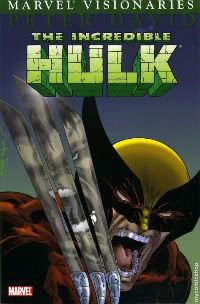 Hulk Visionaries: Peter David Vol. 2
Hulk Visionaries: Peter David Vol. 2Writer: Peter David
Artists: Todd McFarlane, Jeff Purves, and Erik Larsen
Published by Marvel; $19.99 US
Collects Incredible Hulk #s 340-348
Hulk Visionaries: Peter David Vol. 2 collects Peter David and Todd McFarlane's "Ground Zero" storyline as well as the first 2 issues of the Las Vegas stories that would come to define the gray Hulk for many readers and subsequent Hulk writers.
"Ground Zero" was the end of what I like to call the Bubble Van Era of the gray Hulk, named for the S.H.I.E.L.D. van the book's band of heroes stole from gamma base.

I'm using the word "era" fairly liberally, but it was probably my favorite piece of David's time with the gray Hulk. After escaping gamma base and learning the military is building and stockpiling the same bomb that turned Bruce Banner into the Hulk, Banner, Clay Quartermain, Rick Jones and later Betty Banner travel across the country hoping to find and dismatnle the gamma bombs. At the same time they're dogged by cronies of The Leader, and as usual the Hulk manages to get himself in a couple of brawls unrelated to the bombs or his weird-headed arch-nemesis, including the classic McFarlane-rendered showdown between Hulk and the callous Cahnuk on the cover.
Peter David wrote Incredible Hulk for 12 years and his varied, and often innovative, interpretations of the Hulk brought the character back to the center stage of the Marvel Universe and rendered him much more palatable for adult readers. There are doubtless many questions David asked himself before deciding how to write his early version of the Hulk, and upon re-reading this collection for review, I couldn't help but think that one of those questions had to be "Doesn't the Hulk want a life all his own?"
Whether he was in denial or just plain dumb, the savage "Hulk Smash" Hulk was never truly conscious of his connection with Bruce Banner and so the only life he knew or wanted was one where at best he kept himself out of the reach of the army, super-villains, and super-heroes until he inevitably turned back into Bruce Banner. The idea that he could build any life for himself - even if that life meant nothing more than roaming the wild and scrounging for food - could never be articulated beyond his oft-repeated "HULK JUST WANTS TO BE LEFT ALONE!"
While the Hulk always hated "puny Banner," since the gray Hulk was actually aware of his unhappy cohabitation with Banner, these issues are some of the first when we actually read the Hulk - instead of Banner - talking about what sucks about being half of a whole. In the third chapter of the trade, the Hulk is able to defeat the energy leech Half-Life with a tale of his woes. After Half-Life drains the Hulk of most of his power, the gray goliath tells him what he has to look forward to, and Half-Life's dread and fear for what's to come makes him self destruct.
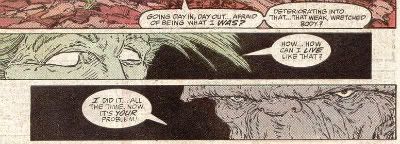
While a lot of hardcore Hulk fans found the gray Hulk hard to accept because he was physically weaker than the green Hulk and morally compromised, in a few early chapters of the trade the gray Hulk makes it clear he not only sees himself as an improvement, but saw his past as the green goliath in a humiliating light.
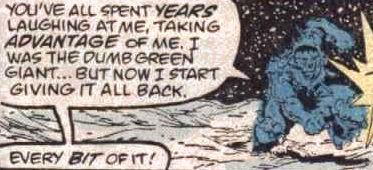
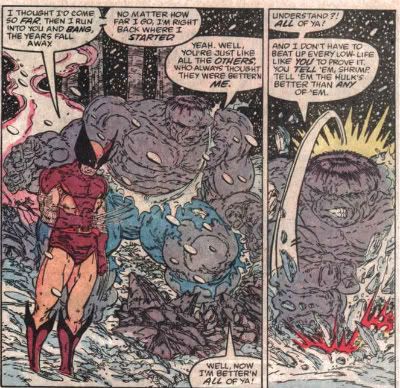
When Hulk fights Man-Bull in the second chapter, David uses Man-Bull as a kind of Flowers for Algernon reflection of the Hulk, reminding him what he once was and what he could be again.
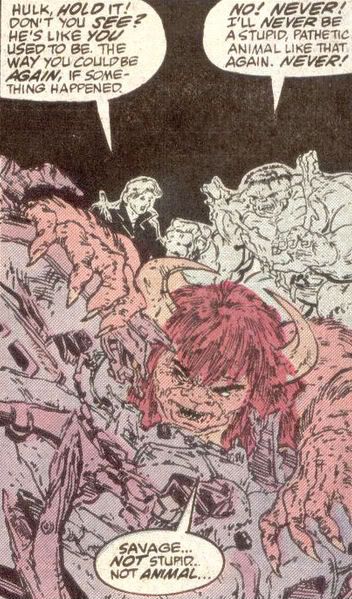
While I wouldn't go so far to say David was the first writer to show qualities of Banner in the Hulk and Hulk qualities in Banner, I would say he capitalized on their duality in a way no one had before. Though often thuggish and sadistic, the gray Hulk has some surprisingly tender moments, most memorably in "Pyrrhic Victory", when Betty Banner convinces the Hulk to speak to her one-on-one and eventually reveals that she's pregnant with Banner's child.
In particular, I have always loved one particular moment of that issue. When Betty refers to Hulk as "Bruce," Hulk of course tells her not to call her that. When she says "Methinks thou dost protest too much" he responds--

I don't know, there's just something wonderfully human about that. He's obviously not happy with her, but I don't get the usual sense of venom. For the Hulk to respond to Betty in the same faux heightened speech borders on actually being playful, and for this particular version of the Hulk to react in a not-completely-murderous manner to anyone over anything is significant.
It was a more human Hulk that made the climax to "Ground Zero" so powerful. For Hulk to whisper Betty's name the second before the explosion of the gamma bomb that he assumed would be his death, for him to refer to the gamma bomb as his "Mom" revealed a more emotionally vulnerable Hulk than readers had experienced in a while.
Speaking of the Hulk's narration, "Ground Zero" in particular used a narration style that I think is more commonplace now in super-hero books (read any DC comics that came out close to Infinite Crisis and it seems downright compulsory) but I don't think was standard at the time - first person narration from one of the characters involved rather than a God's Eye narration style. David uses the voices of Rick Jones, Betty Banner, and even Wolverine in his stories. I recall when I first read these issues, finding it wonderfully weird to actually read narration from the Hulk. Of course, he didn't really have the dialogue range for it before, though to be fair I'd say Erik Larsen and Kurt Busiek did a hilarious job with some Hulk-Smash-style narration in the sixth issue of the second volume of Defenders.
I don't want to talk too much about the Vegas issues here because those stories are more dominant in the third and fourth Hulk Visionaries trades, which I intend to review soon. However, it is kind of interesting to see the first two Vegas issues in the same collection as the "Ground Zero" stories, simply for the color contrast if nothing else. The Bubble Van Era stories mostly take place at night because the Hulk only came out once the sun went down, whereas every other panel of the Vegas stories here are filled with bright yellows and golds. I think maybe that's one of the reasons why the Vegas era was a little tough for me to swallow, though I'll talk more on that in the next review.
------------------------------------
Though I know it doesn't speak directly to the quality of the collection, I do want to end this with a tangent that reveals me as the unapologetic Hulk fanboy that I have never denied I am. I appreciate comics as an art form and they're an important part of my life. But the gatekeeper who beckoned me to the world of comics was green, and sometimes gray, and if you don't like it when I get my geek on, hey. Blogs are free. Get your own.

I may be wrong and don't have a link to a quote to prove it, but if I recall correctly, David has said the classic "Vicious Circle" issue - whose cover was used for the cover of Hulk Visionaries: Peter David Vol. 2 - came about because he liked to ask his pencilers if there was anything in particular they really wanted to draw and always tried to write a story to facilitate that. McFarlane wanted to draw Wolverine, and hence Incredible Hulk #340 came to be.
I get the Hulk/Wolverine rivalry. Thematically, it makes sense. It's kind of cool. Like a wolverine (a real one) trying to take down a grizzly. In a way, it's indicative of the very soul of Wolverine's character - tearing into huge, powerful foes in spite of having a body a few inches shy of officially being considered a little person (something that I think has been forgotten fairly often since Bryan Singer decided that the best way to portray a small, ugly man was to cast Hugh Jackman in freaking bell bottoms).
But I just don't buy it. And when it comes to this stuff, I'm usually willing to buy a lot. I don't bitch about power levels and keep out of versus debates, but the Hulk/Wolverine rivalry is just kind of tough to swallow. It's like trying to create a rivalry between Spider-Man and Thor. I seem to recall a scene in The Dark Phoenix Saga when Wolverine gets taken out by a bunch of jerks dressed like George Washington and armed with rolling pins. That guy is not going to be the guy who gives the Hulk a fight.
And it's something Marvel tried to sell hard as a result of Incredible Hulk #340's success. In an issue of Infinity Gauntlet, as the heroes gather before the assault on Thanos, Hulk and Wolverine talk on a roof (I forget where the heroes were gathering, maybe Avengers mansion?). Hulk says something to Wolverine along the lines of "When you fight someone as many times as you and I have fought, you get to really know him." Well, at that point, they'd fought maybe three times, including Wolverine's first appearance and the "Vicious Circle" story in this collection. There are a ton of heroes Hulk fought more times than he'd fought Wolverine. Hulk fought fire hydrants more than he fought Wolverine. I'm pretty sure I fought Hulk more times than Hulk fought Wolverine.
And that's fine I guess. Yes, they manufactured a long history of violence between two characters that didn't exist, but the characters in question don't really exist either, so whatever. Still, the notion of a rivalry between these two always bothered me. And in spite of the fact that it was a poorly conceived mini-series, I took a great deal of satisfaction in watching Wolverine treated as nothing more than a distracting nuisance to the Hulk in World War Hulk: X-Men.

5 comments:
Please, tell us more about the last time you fought the Hulk.
Some shit went down. I didn't want shit. He didn't want shit. But shit doesn't care about what you want. It just happens.
When the shit went down it went bad. How bad? Real bad. You know how shit never goes your way? That's the way it went.
When the smoke cleared the shit was all over the place. I don't know how we survived that shit. I don't think I'll ever forget that shit. And I don't think that I should. Or should I? Shit.
It's been a very long time since I looked at these books, but Peter David's Hulk run holds a special place in my memory. Back in junior high and high school, I was exclusively a superhero reader, and this was my favorite book. I bought over 100 issues new off the stands. I particularly remember enjoying the later part of the run with Dale Keown and then Gary Frank. The earlier issues with Todd McFarlane I think were more inconsistent. Still, I wonder how I would feel about these books now.
Yeah, David is brilliant. And like you mentioned in your review of Volume 1, it was him that really helped shape and mold my taste in comics as a medium rather than a time-killer. I'd even argue that the current crop of writers - particularly guys like Bendis - owe a lot of their success and what they're able to get away with to David and what he did with The Hulk, X-Factor, etcetera and so on.
I'm also with you on the Hulk/Wolverine rivalry. Never got it. Well, I got why they emphasized it (them being two of the top three or four most popular Marvel characters), but I could never swallow that this would last more than thirty seconds.
But I know you didn't just talk smack about the Hellfire Club.
Hi nice reading your post
Post a Comment